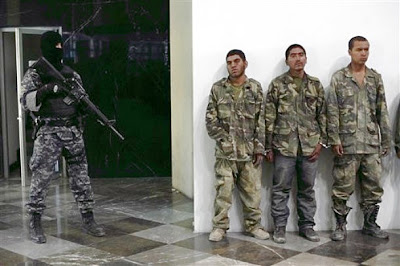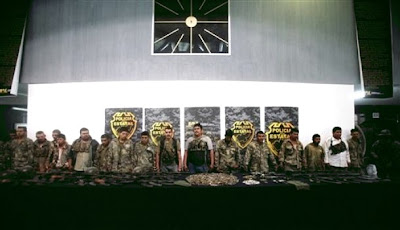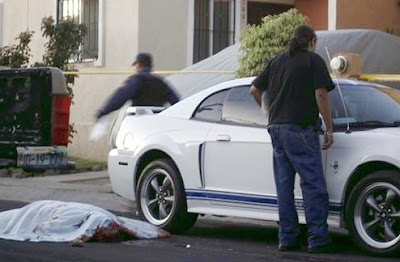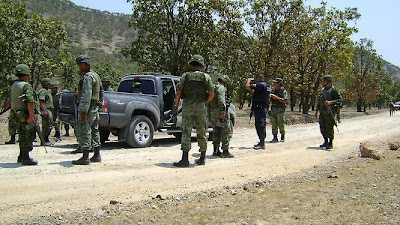The calm that was characteristic in the last three decades in the Guadalajara metropolitan area was in part due to a truce between drug cartels and the low profile of law enforcement, but things have changed in recent months seen in recent skirmishes involving drug gangs fighting for control of the plaza.
Given the recent confronations between sicarios of rival groups, the Army mobilized its troops and conducted several operations in which several suspects were arrested for perpetuating violence, in addition the militaty seized high-powered weapons and drugs. The most notorious incident was when elements of the armed forces stormed the Reclusorio Preventivo de Puente Grande.
So far this year Jalisco has registered more than 129 executions, a lot of them in the last couple of months. The end of last month authorities located yet more bodies many had been mutilated. The state attorney general Tomas Coronado Olmos stated that the number of cases adjudicated so far amounts to 123, compared to 84 recorded during the whole year of 2009.
Jose Nicolas Araujo, chief operating officer of the Municipal Police of Zapopan, is one of the recent victims of violence in the state. He was executed outside his home on May 23. Witnesses told police that Araujo ran out of his house after hearing a truck smash into his car, only to be gunned down when he stepped onto the street. The truck used in the attack was later found abandoned.
Up to press time the state attorney general was conducting the investigations from three lines of communication. It is believed that rampant corruption within various police agencies in the state of Jalisco assisted in the excution of the police chief.
The same police sources say that the Sinaloa cartel leader is the main target of Los Zetas, who entered the territory of Jalisco for several months looking to steal control from the grip of the power base held by El Chapo. They say even that the members of the paramilitary group Zetas arrived in Jalisco straight from the northeast border.
The Zetas arrived directly from Ojuelos and Lagos de Moreno all the way to Colotlán, to the north of the state and down to Tequila and Magdalena, in the northwest. They arrived in Puerto Vallarta in the west, passing through Nayarit. It is in this corridor where they have had several confrontations with members of the Pacific cartel, an ally of El Chapo.
On the alleged morning that the son of Nacho Coronel was abducted a commando of more than 30 people arrived at the residence of El Tigre in Bahia de Banderas, a few miles of Vallarta. They took out the regional leader of the Federation of University Students in Guadalajara, Luis Coronado Fernando Gurrola, and dragged him to the turf of the golf course, where he was executed.
Two women who witnessed the event testified before the Public Ministry of Nayarit that the sicarios took two teenagers by force, one of them is alleged to be the son of Nacho Coronel. Until now, no Nayarit authority has confirmed that one of the two boys abducted was in fact Alejandro Coronel.
Three days later in the capital of Nayarit a commando of more than 100 men responded back by abducting 12 people including Jose Luis Estrada Martinez, "El Pepino," and his father. They were alleged to be scarios of Los Zetas.
An expert in security matters, Haro Reyes did not rule out that at this stage of violence between criminal gangs, El Chapo and his followers, including Nacho Coronel, are losing control of the plaza.
In March 2009, for example, a nephew of Nacho Coronel was arrested in Tlajomulco de Zuniga, according to local media reports. It was José Ángel Carrasco Coronel, aka "El Changel," who was arrested along with other armed men
On that occasion prosecutor Coronado Olmos said that "El Changel" and his accomplices were sent to the delegation of the PGR. However, the detainees never made it to the delegation of that institution, as it was reported by El Universal on March 22, 2009. Hours later, all detainees were released after posting bail.
The second week of last January several sicarios were arrested during a clash with the army, they were; Jesús Gutiérrez López, Raymundo Larios Vizcarra, Ernesto Coronel Peña, José Jaime Coronel and Juan Ernesto Coronel Herrera. The last three appeare to be relatives of Nacho Coronel. Also in the fighting between the sicarios and military forces Avelino Quiñones was killed, a friend of Nacho Coronel.
On the 18th of the same month, the PGR reported capturing Gael Carbel Aldana, the principal operator working for Nacho Coronel in the towns of Chapala, La Barca and Mazamitla in Jalisco. Also detained was Oscar Nava Valencia, El Lobo Valencia. The two had confronted a military contingent in Tlajomulco de Zuniga that resulted in their capture. Carbel and Nava are in the prison Cefereso 3 of Matamoros, Tamaulipas.
The situation of the lieutenant of "El Chapo," "Nacho Coronel," could not bee more serious if the version could be confirmed that he was actually arrested on May 13 during the simultaneous executions of several search warrants at different residences in the sub-division of Bugambilias in the metropolitan area of Guadalajara, and also in El Molino, in the municipality of Ixtlahuacán de los Membrillos, in Jalisco.
According to unofficial versions, in that operation were involved more than 60 marines and at least 30 agents of the Deputy Attorney Specialized Investigation of Organized Crime (SIEDO).
When questioned on the matter, the secretary general of the Government of Jalisco, Fernando Guzmán Pérez Peláez, told the newspaper Público that he could not "confirm or deny anything" about the alleged capture of Nacho Coronel. All he could say that in the operation state agents were not involved. As of May 28, 2010 the PGR had not released any information on the matter.
For Haro Reyes it is clear that violence in the state has gotten worse: "We can see that starting from May 14 (date of the alleged arrest of Col.) that has unleashed the reprisals, we can also infer that there are governmental officials linked to organized crime.
Since that day the State Preventive Police were reactivated in the region. On May 21 for example the corporation reported on the arrest of nine people in Mazamitla, including a 17 years old, belonging to the family cell Michoacan, who "wanted to open plaza in Jalisco and were destabilizing the area with robberies and kidnappings," according to the official bulletin.
On May 22, police patrols and military clashed with suspected Zetas in the mountainous area of Zapopan, in San Cristobal de la Barranca and part of southern Zacatecas. In these actions there were no casualties, although seven grenades exploded.
The following day, the head of state Public Safety, Luis Carlos Gutiérrez Nájera, presented to the media 18 alleged members of the Millennium cartel captured after a shootout. The official said they seized 39 kilos of crystal, two kilograms of marijuana seeds and five kilograms of methamphetamine, as well as 20 firearms, grenade launchers and about 2,200 rounds, seven SUVs, including a Jeep Commander assigned to PRD Congressman Raul Vargas, who the day before had reported the theft of his vehicle.
And on May 24 the Army exhibited to the media more than 13 tons of marijuana confiscated in the town of San Isidro Mazatepec, near Guadalajara. The military said it was one of the biggest seizures in recent years in Jalisco.
Institutional corruption
The specialist Dante Haro Reyes insists that the government's war against organized crime, particularly against drug cartels, is difficult to win. One reason, he says, it's because public officials have ties to criminal organizations.
"When you told us that there are officials involved with the mafia, who are you speaking of?" This was asked of the scholar.
"Corruption and drug trafficking cannot be understood without a social base, and this is formed by the people who are public officials of the security units and other areas of government that have interest in the phenomenal profits that are accrued from organized crime."
"In this case there are also representatives involved from the municipal level, and even elements of state and federal law enforcement agencies. And although I have no names, we are talking about a massive corruption that grows every day. There is clearly a political protection of drug traffickers."
The scholar insists, those who now lead the fight against the group of El Chapo are also interested in issues related to prostitution, weapon smuggling, kidnappings, extortions and human trafficking. Even when the sale and distribution of drugs, a profitable business by the number of people in urban Guadalajara, it is part of these objectives, but is not their primary activity.
However, now that Jalisco ceased to be a transit zone for the facilities offered by its geographical position, says Reyes Haro, it has now started to establish itself as a place of narco-labs with almost half of all the cities are chosen for their highways and roads that link to Michoacán , Guanajuato, Aguascalientes, Zacatecas and Nayarit.
He even warns against this new reality that civil society is immersed between the subjugation of the criminal groups and corporations who still fail to define a joint strategy to control the situation.
The police chiefs are still debating whether there is an organization with a single control. Meanwhile, the municipalities further away from the urban area, as Tlajomulco, Tonala, and El Salto, become easy prey to the crime. And that lack of coordination is exploited by criminal groups, even in cities like Guadalajara, Zapopan and Tlaquepaque, emphasizes Haro Reyes.
The territory that for years was controlled by Nacho Coronel, fractured mainly by the breakup of the Pacific cartel leaders, even with those close to El Chapo, and even more with fracture of the Beltran Leyva brothers. This is why in Jalisco agreements between these cartels do not function any more.
The reason also lies in the corruption of police and public officials. It's just amazing that just in a single police agency there are corrupt public officials or elements of the police protecting different groups.
For Reyes Haro, the struggle for the metropolitan area of Guadalajara should be understood from the clashes recorded last year in municipalities such as Tequila, Magdalena, Lagos de Moreno, Colotlán and the border of Zacatecas, to include Nayarit. It is in that zone where the Zetas control several cities.
And this truly outlines the thesis of a "failed state" that the country could potentially reach, he says, if we do not addressed the problems of corruption in state and municipal governments and police corporations, they will never collaborate an effective method to eradicate organize crime.
He explains: One of the features of any state is to guarantee respect for the guarantees of their constituents, as well as legality and safety. If you cannot, it becomes a failed state.
Does Jalisco run that risk?" he is asked.
"Of course. Jalisco is already in transition."
Haro Reyes says the state authorities should be prepared to live times that are sensitive in regards to security and the fight against narco-trafficking. Today the non-aggression pact that operated for the past 30 years between organized crime groups that at one time had been abundant, has simply stopped working. This is evidenced by the growing number of executions.
Just this end of last month in less than 24 hours Jalisco reported seven unprecedented murders in their territory, the Attorney General admitted that between January and May 2010, 123 murders were documented as executions, 40 in the metropolitan area and 83 in the surrounding towns of the state. While in 2009 there were a total of 84 executed which represents an increase of over 30 percent in just five months.
Haro Reyes ends: "I was just in Ciudad Juarez, where up to 12 crimes per day. It would be regrettable that here in Jalisco, we reached a situation similar to that of the so-called Ground Zero, as it is known in Juarez. "
Faced with the unprecedented increase in violence in the Guadalajara metropolitan area, the mayor Aristóteles Sandoval proposed holding a security summit. However, the governor Emilio Gonzalez Marquez said that at best he will organize a meeting for June with the participation of the secretary general of the Government of Jalisco, Fernando Guzmán Pérez Peláez, and metropolitan mayors.













